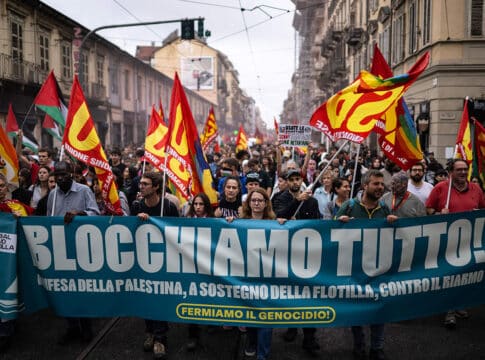Workers’ action shows the way forward
Per-Åke Westerlund, from Offensiv, paper of Socialistiskt Alternativ (ISA Sweden)
(This article was first published on 23 September 2025)
Under the slogans ‘24 hour general strike’ and ‘Block everything,’ the strongest day of protest in solidarity with Gaza in Italy to date took place on Monday, 22 September.
The largest ports were blocked and demonstrations were held in over 75 cities.
The initiative came from dockworkers in Genoa, the country’s largest port, and grassroots trade unions with hundreds of thousands of members. School and university students took part, as did local unions from many workplaces.
The action shows the way forward for the solidarity movement and for stopping the genocide. The hell in Gaza, which is only getting worse, is engaging the whole world and indelibly branding all politicians who support and send weapons to the Israeli government.
Recognitions of Palestinian state
Opposition to the genocidal war has led governments to try to distance themselves from the bloodbath. Now, governments such as France, the United Kingdom and others have approved the recognition of the State of Palestine at the UN summit. Their hypocritical statements, after almost two years of supporting the war of extermination, will not stop Netanyahu’s genocide, which has the full support of Trump. Just last week, the United States blocked a condemnatory but ineffective resolution in the UN.
It is workers’ and grassroots actions that can stop the war. Italian and Spanish dockworkers are also prepared to take action in solidarity with the flotilla of 50 boats, including Greta Thunberg and Swedish MP Lorena Delgado Varas, on their way to Gaza with food and medicine.
Gaza City hell
From Gaza City, Save the Children reports on starving and terrorised children who say they no longer want to live. Since mid-August, the Israeli government’s goal has been to drive out the population by completely destroying the city. Hundreds of thousands have been forced to flee, but as of the weekend of 20-21 September, several hundred thousand remain in the ruins.
The massive bombing is now being supplemented with tanks, artillery and drones. On Monday 22 September, the last two hospitals in the city, a children’s hospital and one specialising in eye care, ceased to function. Israel also ordered the evacuation of a field hospital set up by the Jordanian government.
Long caravans of refugees are heading south in Gaza to camps where there is a lack of food, medicine and places to sleep, but which the Israeli army calls ‘humanitarian zones’. At the same time, bombing continues in Rafah and Khan Younis in the south.
Sveriges Radio employee Sami Abu Salem, his 90-year-old mother, wife and three children are among those who were forced to leave Gaza City last week, all except his mother on foot. In a radio report, he cannot stop crying over the devastation and the fact that they are once again forced to flee.
Smotrich’s plans
Israel’s far-right finance minister Smotrich says that plans to forcibly evacuate Palestinians from Gaza and replace them with settlements and other real estate are continuing, including plans to divide areas between Israel and the US.
Smotrich is also pushing for the West Bank to be formally annexed after 58 years of occupation. He says this will put an end to a Palestinian state once and for all, in response to international governments’ recognition of Palestine. The Netanyahu government is expected to make a decision shortly. How far they go will be decided in cooperation with Trump.
Netanyahu has also repeated that a Palestinian state will never be accepted. The Palestinian Authority (PA), which formally controls the West Bank and has cooperated with Israel, is now a target. Israel is withholding money belonging to the PA, totalling billions of dollars. This meant that schools in the West Bank could not start on 1 September. At the same time, extreme violence by settlers and the Israeli army is increasing, with Palestinians being displaced and villages surrounded.
Opposition and new conflicts
The Israeli government’s eternal war against Gaza, the West Bank and the region is creating new conflicts and resistance. In Israel, a majority is in favour of ending the war in Gaza, and even senior military figures, such as Chief of Staff Eyal Zamir, have criticised the attack on Gaza City. Almost two years of war and crisis have not brought Netanyahu’s ‘total victory’ any closer.
In the region, the authoritarian regimes close to the US and Israel are concerned. The rulers of the United Arab Emirates, the most important of the four states that signed the Abraham Accords on cooperation with Israel in 2020, have stated that an annexation of the West Bank would be a ‘red line’ that would jeopardise the agreement. Qatar has gathered representatives from 50 Muslim and Arab governments in protest against Israel firing missiles at Hamas offices in Doha. Trump’s hopes for Abraham Accords with Saudi Arabia, and perhaps some form of settlement with Syria, may have been postponed.
A sign of pressure and opposition to the Israeli government was when Netanyahu tried to respond to increased international criticism of the genocide in a speech on 15 September. With extreme nationalism, he called for a ‘super-Spartan economy,’ a comparison to a historically besieged state that can only rely on itself and needs increased self-sufficiency. But the right-wing nationalism that the government has used since the Hamas attack and the start of the genocide war nearly two years ago is not having the same impact as before, either in Israel or internationally.
For all those fighting against genocide, the way forward is escalated workers’ protests, including in Israel, without any trust in governments or the UN. The struggle for a free Palestine is a struggle against capitalism and imperialism.

